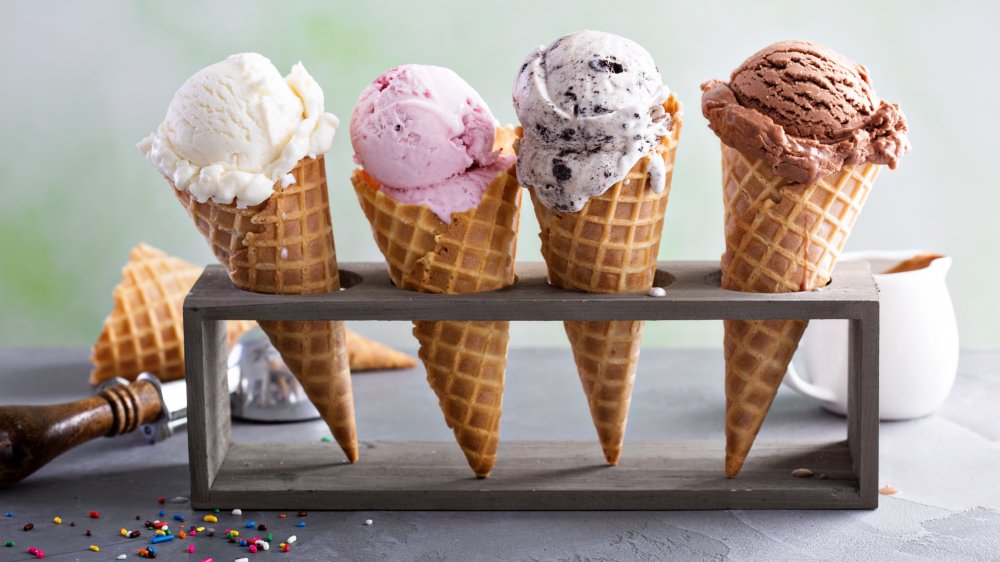The Reason You Shouldn't Eat Ice Cream Right Now
From sudden surges in from-scratch cooking and homemade bread baking to grocery store sellouts and memes circulating about gaining the "Quarantine 15" when trapped at home (via Self), food has become a major talking point in the times of COVID-19, and we're not just talking about restaurants being closed or ordering curbside meals.
But many health experts are discussing food's importance right now for a different reason: obtaining the proper nutrition so that the body's immune system strengthens and can better resist diseases. In a nutshell, according to the National Center for Biotechnology Information (NCBI), "Nutrition is a critical determinant of immune responses," so lacking even a single nutrient can damage those responses. And, of course, the NCBI explains that the immune system is tasked with fighting off pathogens such as viruses.
How nutritional habits affect the immune system
In other words, while many of us reflexively reach for junk foods versus health foods in trying times, nutritionists warn that we aren't doing the body any favors, especially if we come into contact with diseases that require a strong immune system response.
Back in 2008, scientists drew a link between regular milk and red meat consumption and "mild but continuous inflammatory immune response" (via Scienceline). Also, excess sugar can "hinder the body's immune functions," board-certified internist and gastroenterologist Niket Sonpal said, and it's also a trigger of low-grade inflammation (via HuffPost). What you don't want to happen, then, is to experience an illness where you'll be counting on a strong immune system to fight it off — but yours is already busy dealing with ongoing inflammation because of the foods you're eating.
And what food combines both sugar and dairy in a perfect storm of frozen seduction? Yep, ice cream.
Why ice cream is the worst choice right now
In Eat This, Not That!, doctors explain that because this combo causes inflammation, the immune system experiences more pressure, "leaving us more susceptible to disease and illness," according to Sydney Greene, MS, RD. Yes, plenty of processed foods can cause inflammation, but the one-two punch of sugar and dairy (not to mention high saturated fat levels) makes ice cream a repeat offender in every scoop.
While dairy products are sometimes recommended for providing nutrients like vitamin D and protein, ice cream probably isn't the best bet when healthier options, like fish and beans, can provide them instead (via CNN). It might sound particularly cruel to have to give up ice cream alongside all of the other sacrifices we've made lately, so if you must indulge, Eat This, Not That! recommends trying dairy-free alternatives. Or, if your willpower can remain strong in the face of a few pints stacked in the fridge, you might simply practice old-fashioned moderation.
Don't avoid ice cream because it's cold — instead, avoid it because of its ingredients
Recently, however, there was a rumor floating around, courtesy of a fake UNICEF flyer disseminated via Facebook, that listed several ways people can avoid COVID-19 (via PolitiFact). One of these reasons was "avoiding cold foods," which, of course, includes ice cream. This seems to have sprung from the limited information we have that human coronaviruses aren't a big fan of heat, but there is no scientific evidence that consuming ice cream (or any other cold food or drinks) will make you more susceptible to the disease based on temperature alone (via WHO) — just like there isn't evidence that consuming hot things will help you avoid contracting the virus.
Instead of the temperature of the treat making you more likely to get the virus in the first place, instead, the ingredients contained within hamper your immune system, which makes it more difficult to fight it off if you do get sick.
Noshing on a scoop of ice cream every now and then probably isn't a huge deal, but if you're faced with a choice between ice cream and a bowl of fruit or veggies, well, you'll be better off in the long run sticking to fresh produce instead of a dairy- and sugar-laden delicacy.



